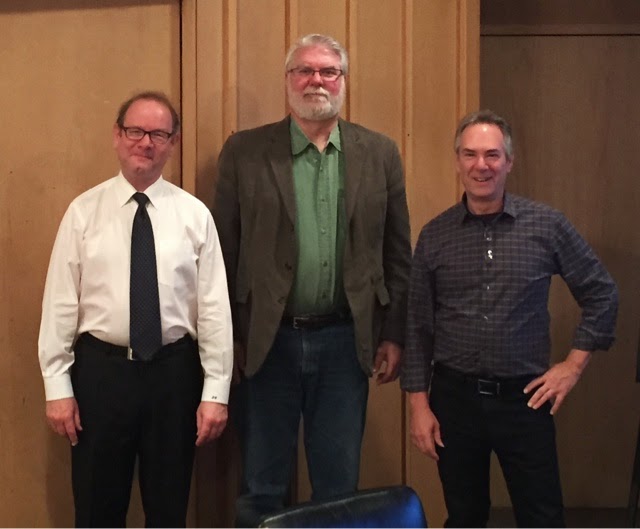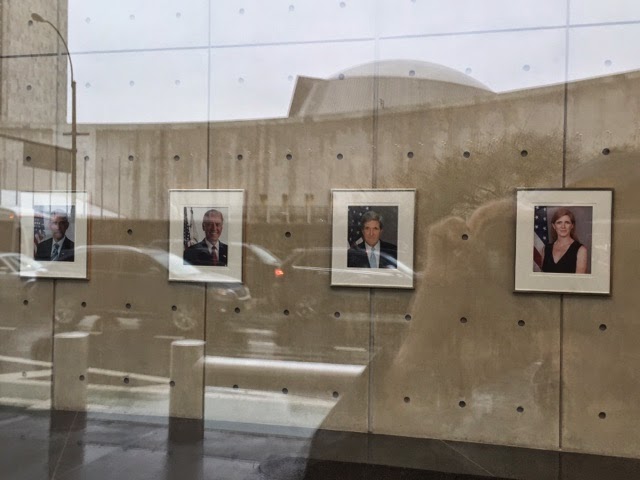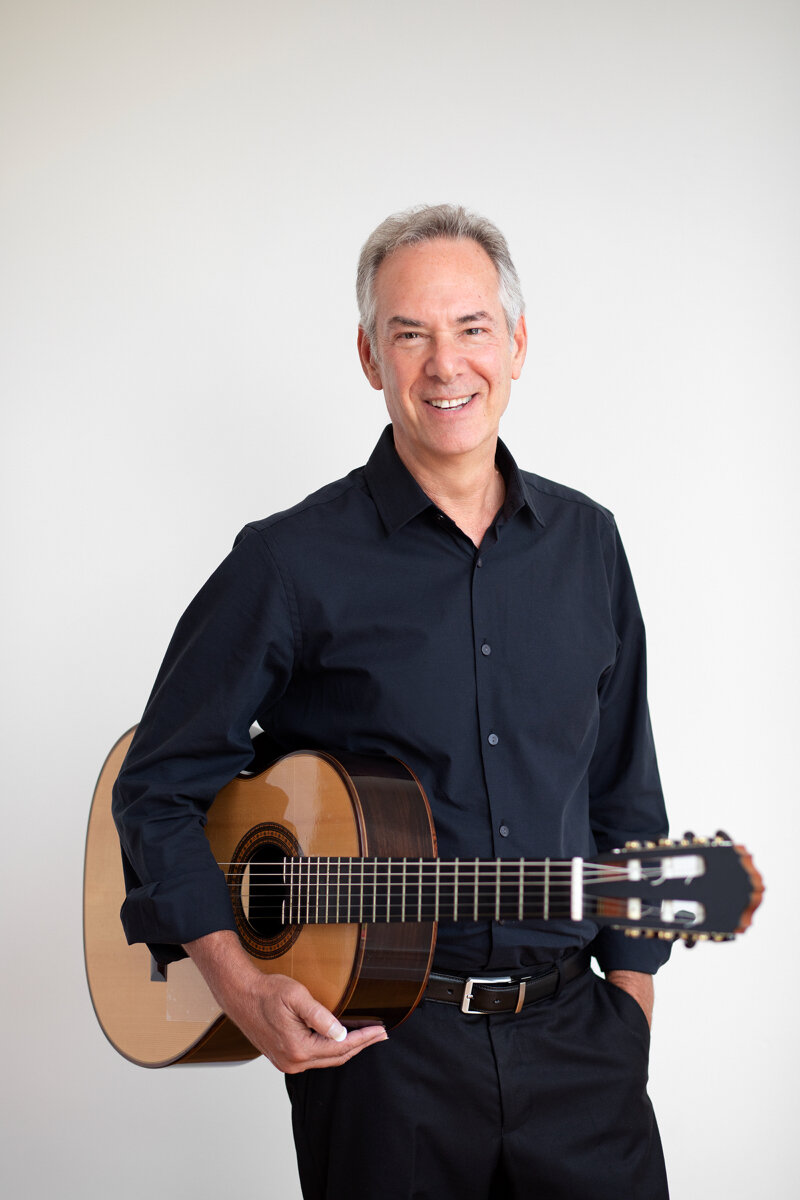Guitar and the Fulbright, Part 2
I was honored to be asked again this year, for the third time, to sit on the strings committee for the Fulbright awards. For those not aware, the Fulbright is a US government-sponsored program for study/research abroad. It is administered by the Department of State and is perceived as a meaningful way to engender peace through cultural exchange, one person-to-person interaction at a time, and has been running without interruption since the Truman years. The awards are competitive and so winning one is prestigious. After my last panel experience, in November 2013, I wrote a lengthy blog entry on the Fulbright, explaining them in detail. The post is
.
This entry is a follow-up: has there been any change in the number, mix or quality of the entries? My primary intent last year was to encourage guitarists to apply.

David Geber (cello, Manhattan School of Music), Davis Brooks (violin/viola, Butler University), and Stephen Aron
In 2012, there were two guitar applications. (My committee, charged with judging entries in strings, looks at applications by violinists, violists, cellists, bassists, harpists and guitarists.) In 2013, there were NO guitar applicants. This year, there were three. Our total applicant pool this time was only 12. Twelve! (There were no bassists this time, and only one violist.)

U. S. Government Administration portraits
Of course I have no idea if my cheerleading blog post last year had any impact on the guitar number going up (from 0-3 is not exactly enough data for a statistical analysis!) but I was happy to see more guitar entries. I feel strongly that this opportunity is so superb that our panel should be literally overwhelmed with entries. Instead, we were done well before the lunch break.

Geber, Brooks, and Lora Seery, our Committee Facilitator
Think of it for a sec: in exchange for a couple of well-written essays, a thoughtful proposal and a reasonable video audition, hopeful applicants receive a living stipend, free tuition and travel costs for living in the country of their dreams. For a year.
Applicants need only have completed their bachelor's degrees. In some locations, facility with the local language matters, in others, it's a non-issue. A small amount of reading on the
will answer most questions.
What's really amazing is that our panel is not given a numerical cap. We can select as many applicants as we feel are worthy. If all the entries are terrific then they'll all be recommended for acceptance. (We ok'd seven out of twelve).
It is expected and understood that applicants are students and that, essentially, they seek opportunities to continue studying, but with a teacher of special interest in a particular location. The projects are often repertoire driven: teacher A in city B was the dedicatee on and gave the premiere performance of really important piece C, therefore in order to study that piece at a high level and others like it, that is the only place to do so. Or sometimes the projects incorporate an educational bent: a particular method of instruction is used only in school D in city E and the applicant wishes to immerse in that method to compare and contrast it with prevailing methods at home. The Fulbright Commission asks that applicants incorporate interaction with the community as part of the proposal. Normally for musicians, this means giving one or more public performances at the end of the year. Some applicants wanted to offer free instruction to local underserved children as part of their experience.
The proposals really do not need to be complicated. It is critical to have a host institution/teacher vouch for their interest in you. This part requires establishing communication with someone there and a school to ascertain what options might exist for a visiting student, and how to apply. It can take time. So getting started well ahead of the October deadlines makes sense (like, now, for the application deadline in 2015, for living abroad in 2016-17; juniors, take note).

The U. N. Building, across the street.
As a panel, we were sometimes torn between our two competing charges: to pick compelling, talented musicians and to pick compelling, interesting projects. Some of the best ideas were accompanied by insufficiently adept audition recordings and vice versa. In the end, it emerged as necessary to play well, but not necessary to be a virtuoso (we understand the applicants are still students). It was necessary to write a good proposal with a high chance of success. Some applicants clearly did not have anyone proof their writing and they suffered for it. Good writing helps- after all, it is an essay-heavy application for a grant that features communication with people as part of its goal. So, if you're not a strong writer, it's sensible to get some help.
Of the three guitar applications we received, one was recommended. This lucky guitarist will be the first in three years to win a Fulbright!
As I mentioned in my previous post on the Fulbrights, my son, Miles, won one last year in the field of engineering. He just finished his Fulbright year, spent doing unique research at the University of Zurich in Switzerland. His experience was nothing short of incredible. He'd never before been abroad; by the end of that year, in addition to living day-to-day life in a gorgeous historic Swiss city, surrounded by the Alps, he traveled to Italy, France, Germany, the Netherlands, Hungary, and the Czech Republic. He befriended a cadre of interesting people from around the world (lab partners, fellow Fulbrighters, people met at parties, etc.) and learned enough German to carry on conversations with strangers comfortably. He did not get financially ahead, but neither did he spend significantly for this experience. What an amazing time he had!
Miles writes:
"I made friends from all over the world who I am confident will remain friends for the rest of my life. I saw things I couldn't have fathomed. I heard languages and accents and ideas all foreign to me. I was pushed to new levels in my area of study. Food and drink was a whole new experience. The night life and day life were entirely new. Lakes, palaces, castles, canals, clubs, hostels, mountains, so many people, so many cultures... Just know that I'm holding out because there's no point in trying to describe it. You have no concept of what it is like to live in another country until you live in another country. One year of research on whatever you want, wherever you want, with whoever you want, with enough money to live comfortably in your host country, and with access to a whole new network. That is Fulbright. Isn't that worth the time it will take to submit a successful application?"
Some colleges produce a greater share of Fulbrighters than others. I was delighted that of the seven applicants we ok'd, five were either Oberlin students or Oberlin alumni(!). Oberlin has about 3,000 students; over 60 students from there applied this year for Fulbrights (in all disciplines); by contrast, my other home, The University of Akron, with over 30,000 students, produced three applicants, total. THREE! This is in no small measure a result of one extremely active and engaged Fulbright campus liaison on the one hand, and an extremely ineffective one on the other. It is too bad: think of all the potential students at Akron and schools like it, with ineffective Fulbright liaison staff, who never hear of this opportunity.
Still, curious students can find out about this on their own, and many do. Here's to more yet, and especially, more musicians. OK, especially more
guitarists
!




